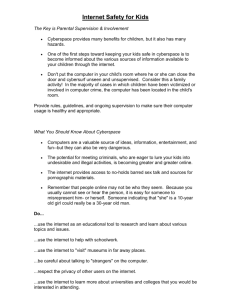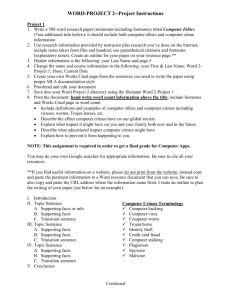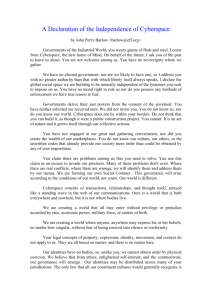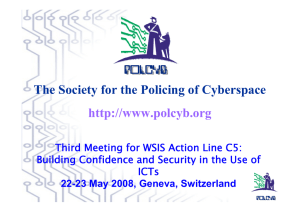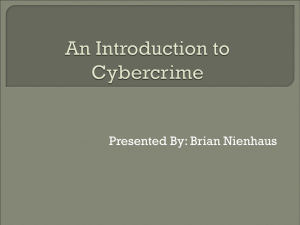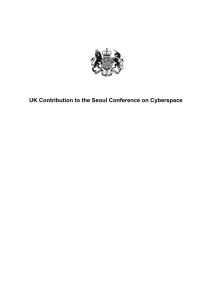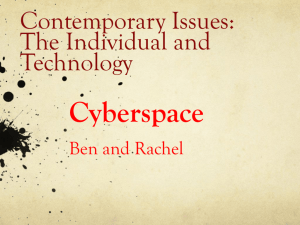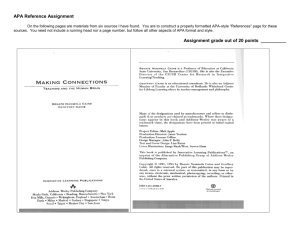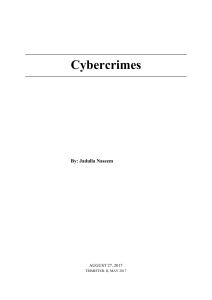Cyberspace Law Reform
advertisement
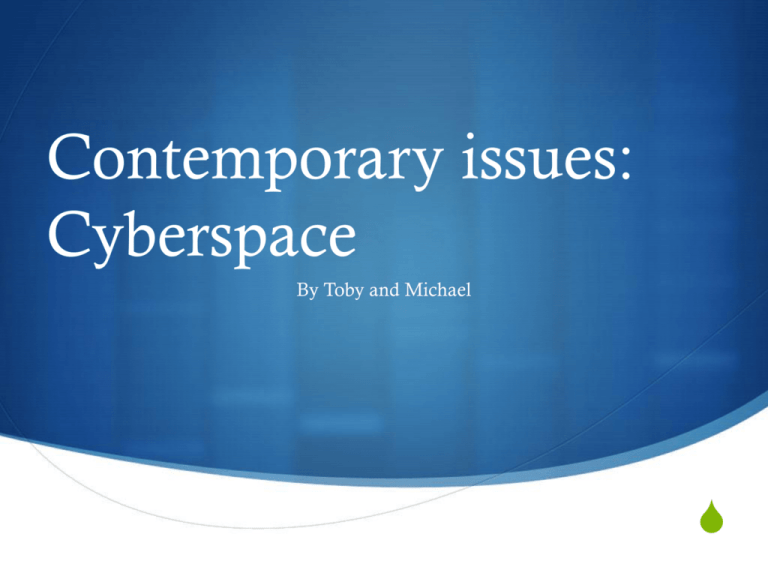
Contemporary issues: Cyberspace By Toby and Michael S Introduction Cyber space is the environment in which electronic communication occurs; the culture of the internet. The Nature of Cyberspace S There are three distinctive features of cyberspace: • It facilitates anonymity – it allows anyone to say anything and remain anonymous, or have a fake identification. • Creativity – the internet allows for information and service to be accessible to almost anybody. Individuals or groups can create software and further develop the internet. • Global – the internet is accessible globally. Individuals from different countries can communicate and international online communities may be established. Information or ideas can be spread across countries. Cybercrimes S A cybercrime is criminal activities committed via the use of the internet and computers. S Types of Cybercrime may include: • • • Hacking Internet fraud Spam Hacking (Cybercrime) S Hacking is an unauthorized access to data held in a computer or computer system. Changing data and interfering with electronic communication between devices is also considered hacking. S The Cybercrime Act 2001 (Cth) recognised offences pertaining to computers, data and the internet. These offences are recognised as federal offences under the legislation. Although in some cases they can be charged under the states powers. In some cases such as R v Boden (2002) in Queensland they can be both charged under laws that do not directly relate to cyberspace. In this case Boden hacked into the sewage system pumps which released a million liters of sewage around the sunshine coast area. He was then charged under the terms of the Criminal Code 1899 (Qld) which prohibits the use of identification information to commit an indictable offence. Internet Fraud S Fraud is intentional misrepresentation or concealment in order to deceive or mislead. S Internet fraud can be carried in a number of ways often with conjunction to hacking. S Fraud may also be perpetrated through the use of fake websites. S An example of internet fraud is a scam, which is an attempt to obtain money through deception. Email scams – these are well known scams. Often they promise large rewards for aiding an organisation or bank with financial difficulty. It involves transferring money electronically and supplying banking details. Phishing – this is another common form of a scam where an email is sent asking for account details. Spam S Spam is junk mail received electronically. Most spam is harmless however, a lot of spam is designed to be damaging to the recipient. Spam can be used for the purpose of fraud and can advertise unwanted items. S spam act 2003 (Cth) – it is illegal to send unsolicited commercial electronic messages through email, instant message services (im), sms, text, phone or multimedia message service (mms). It is enforced by the Australian Communications and Media Authority (ACMA). This act also amended other statuaries that allow for the enforcement against spam. Law Reform: S Cybercrimes are new to the legal system and is continuously changing and so the law is also required to do so, to protect peoples rights. Many of these statutory laws have only been made in the past 20 years. S For law reform to be effective in the cyberspace it must be broad and introduced quickly to keep up with the dynamic and growing cyberspace. S ‘Unique Cases’ may arise and the courts must generate precedents to adapt to these cases. Significant Events S Threats – S A teenage student threatened to kill two of his teachers and a school girl on his MySpace website in 2006. S A guy in WA posted a YouTube video which showed him making threatening comments towards people of a particular ethnic and religious groups. Continued. S Stalking (online) S In 2009 an individual from Victoria copied pictures from a girl’s profile and posted them on adult websites along with her name and contact details. Police investigated the case. S In 2011 an American girl received threatening messages and unwanted gifts from a teenage boy. He was arrested under stalking. Continued.. S Defamation S In 2009 a teenager in SA made a harassment page on Facebook that made false accusations of a local police officer. He was sentenced to a two year good behavior bond for defamation. S Gutnick v Dow Jones & Co Inc. [2001] Victoria VSC was a case in the Victorian Supreme Court. The case was about the company posting on a financial journal website labeled ‘Barron’s Online’. It alleged that Gutnick had irregularities in business dealings with religious charities and with a convicted criminal Nachum Goldberg. The High Court dismissed an appeal by Dow Jones to have the court case heard in America, stating it was under Victorian jurisdiction. Gutnick successfully sued the company for defamation. The case made the precedent to the place that material is viewed is where the jurisdiction comes under rather than the location it was posted at. Summary on Events S These events indicate that the law was administered from existing statutes, and that were not directly related to cyberspace. This may demonstrate a need for reforms/amendments in the future to aid interpretation of statutes and apply them to cybercrimes. Conditions that gave rise to law reform S The increasing frequency of cybercrime is seen as the main condition of cyberspace law reform. Societies’ views on these crimes have remained relatively the same; however the increasing frequency of these crimes are getting the attention of the public. S This is a graph about the amount of cybercrime cases that are reported to this website. Legal Responses S The law reforms such as the Cybercrime Act 2001 have made changes such as requiring encryption data to be released from computers; and banning some security software which allowed for complete anonymity, which contradicts some of the common law decisions made in the courts. S Some laws such as the Cybercrime Legislation Amendment Act 2012 (Cth) have been introduced to allow for greater cooperation with other countries in investigating crimes. Also some companies may keep records of conversations of employee’s. Some argue that this legislation is ‘invading their privacy’. Difficulties of Enforcing (Effectiveness) S It is mostly anonymous. S There is no ‘nation boundaries’ so crimes can be committed across two nations. Therefore it is difficult to enforce or punish crimes committed in multiple nations. (e.g. which jurisdiction does it come under?) Another issue is that a crime in one nation may not be a crime in another in regards to the cyberspace. S People can have fake accounts on websites and make it difficult to identify the individual or group. S There is a lot of cyber crimes. It makes it difficult to investigate the crimes if there are so many of them. Issues of Cybercrimes (Effectiveness) S The victims rights are often not held as the perpetrator often ‘gets away’ with the crime. S Cyber crimes are relatively easy to commit instead of physically stealing money. (for example downloading a movie is easier than stealing it from the shop). THE END
